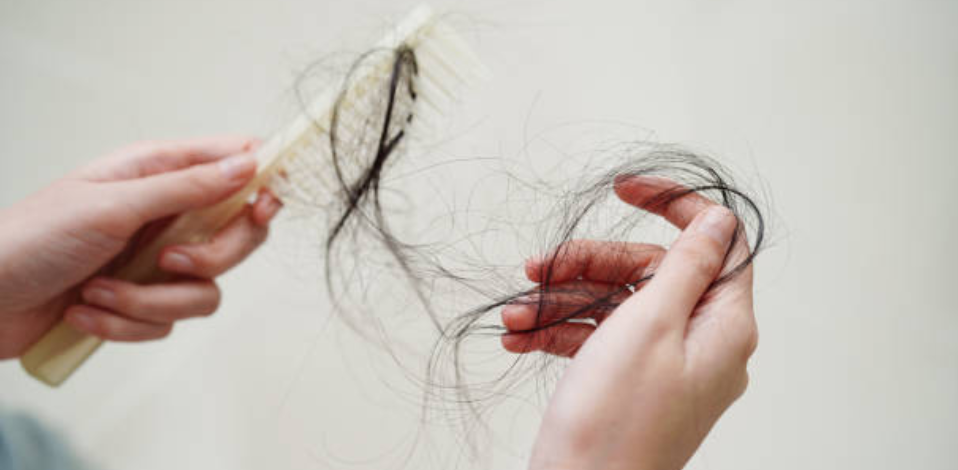Hair loss is a common issue that affects people of all ages. Understanding the reasons behind hair loss is the first step towards finding effective solutions. This article will discuss five common causes of hair loss and offer practical steps for managing and treating it.
-
Genetic Factors (Androgenetic Alopecia)
One of the most common causes of hair loss is genetics, specifically a condition known as androgenetic alopecia. This condition, also known as male or female pattern baldness, is inherited and often begins gradually. Men may notice a receding hairline or thinning at the crown, while women typically experience overall thinning.
What Is Androgenetic Alopecia?
Androgenetic alopecia is caused by a combination of genetic factors and hormonal changes, which lead to the shrinking of hair follicles over time. This results in shorter, finer hairs and eventually halts hair growth.
-
Hormonal Changes
Hormonal fluctuations can significantly impact hair growth. Pregnancy, menopause, and thyroid imbalances may lead to hair loss.
Pregnancy and Postpartum Hair Loss
Many women experience postpartum hair loss due to hormonal changes. This type of hair loss is usually temporary, and hair typically regrows within a few months.
Thyroid Disorders
Both hyperthyroidism and hypothyroidism can lead to hair thinning and loss. An overactive or underactive thyroid can disrupt the hair growth cycle, resulting in noticeable shedding.
-
Stress and Trauma
Physical or emotional stress can trigger hair loss, typically through a condition known as telogen effluvium. This type of hair loss occurs when stress causes hair follicles to enter a resting phase, leading to excessive shedding.
Telogen Effluvium
Telogen effluvium is a temporary condition in which a significant number of hair follicles stop growing and enter the shedding phase, often occurring after surgery, a significant illness, or during periods of emotional stress.
-
Nutritional Deficiencies
Remember that a lack of essential vitamins and minerals can lead to hair loss. The body requires proper nutrition to support healthy hair growth. Deficiencies in certain nutrients can impact hair health.
Common Deficiencies
Nutrients like iron, vitamin D, and biotin are important for maintaining healthy hair. A deficiency in these nutrients can cause hair to thin and become brittle.
-
Medical Conditions and Medications
Medical conditions and medications can contribute to hair loss. Conditions such as alopecia areata, scalp infections, and medications like chemotherapy can lead to significant hair shedding.
Common Medical Conditions
Alopecia areata is an autoimmune condition where the immune system attacks hair follicles, resulting in hair loss in patches. Scalp infections, such as ringworm, can also contribute to hair loss.
Trust your health to The DERM Center
Hair loss can be distressing, but understanding its cause is important for finding the right treatment. Whether it’s due to genetic factors, hormonal changes, stress, nutritional deficiencies, or medical conditions, there are steps you can take to address hair loss and promote healthy hair growth. If you’re concerned about hair loss, consider scheduling a consultation with a dermatologist at The DERM Center to explore your options.
Take control of your hair health today! Contact The DERM Center to schedule an appointment and discuss personalized treatment options for hair loss.
Here are some highlights!
- Genetic Factors: Androgenetic alopecia, or pattern baldness, is a common cause of hair loss influenced by genetics and hormones.
- Hormonal Changes: Pregnancy, menopause, and thyroid imbalances can lead to temporary or prolonged hair loss.
- Stress-Related Hair Loss: Physical or emotional stress can trigger telogen effluvium, a condition where stress leads to increased hair shedding.
- Nutritional Deficiencies: Lack of essential nutrients like iron, vitamin D, and biotin can cause hair thinning and loss.
- Medical Conditions: Conditions like alopecia areata, scalp infections, and certain medications can also result in hair loss, requiring professional evaluation and treatment.
FAQ
1. What other dermatological conditions does The DERM Center treat?
The DERM Center offers care for a wide range of skin, hair, and nail conditions, including acne, moles, skin cancer, and more. We provide medical and cosmetic dermatology services tailored to each patient’s needs.
2. Can children be treated for hair loss at The DERM Center?
Yes, The DERM Center provides comprehensive care for both adults and children, addressing hair loss and various dermatological issues. Our team understands the specific needs of pediatric patients and delivers compassionate, effective treatment for children experiencing hair loss.
3. How do I book an appointment with a dermatologist at The DERM Center?
Appointments can be easily booked by calling our office or visiting our website. We offer flexible scheduling to meet your needs and ensure you get timely care for your dermatological concerns.
